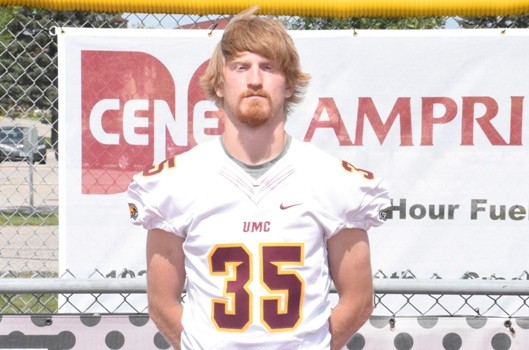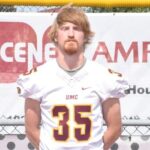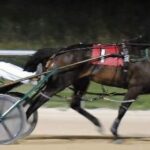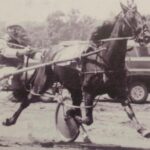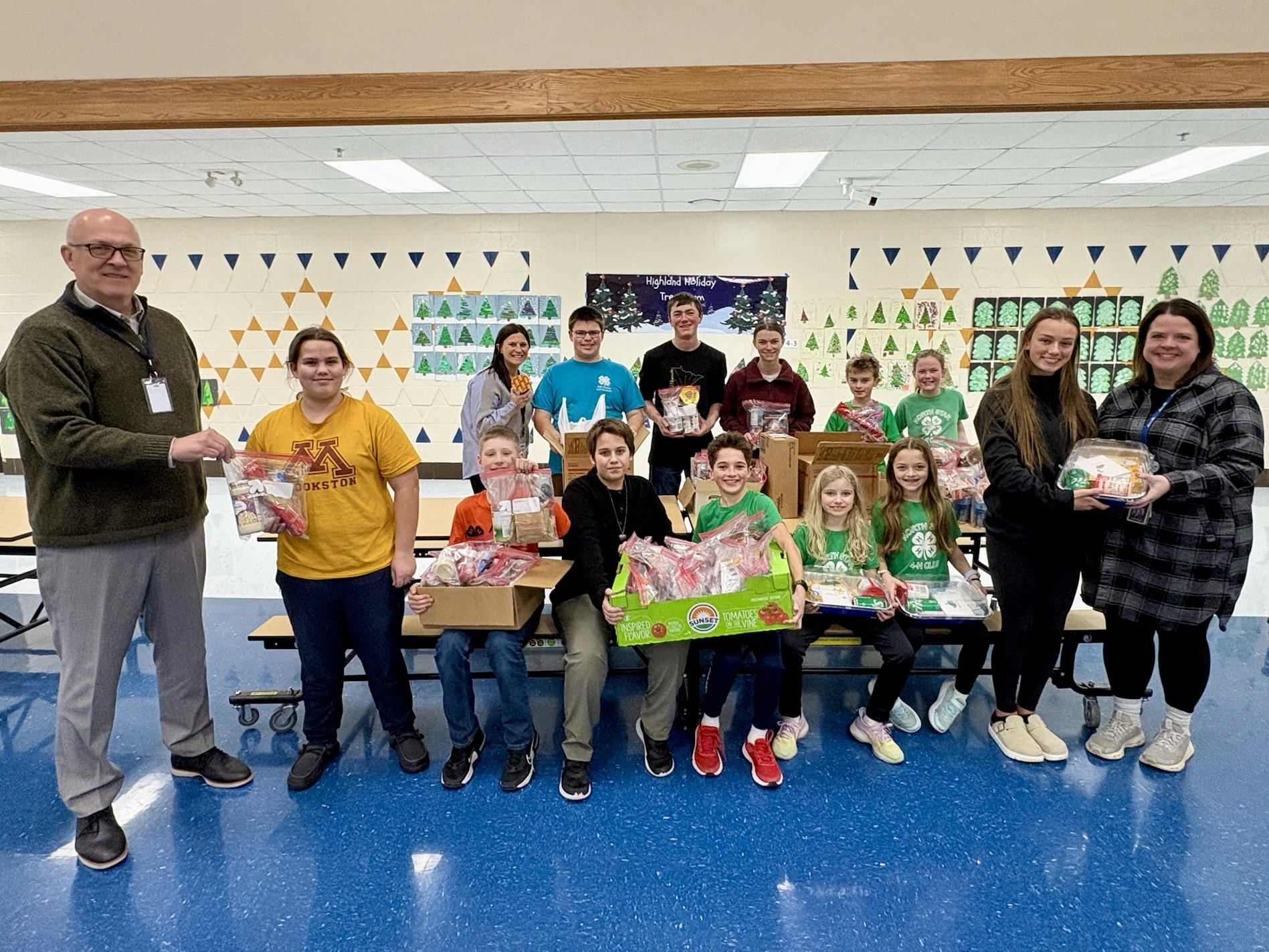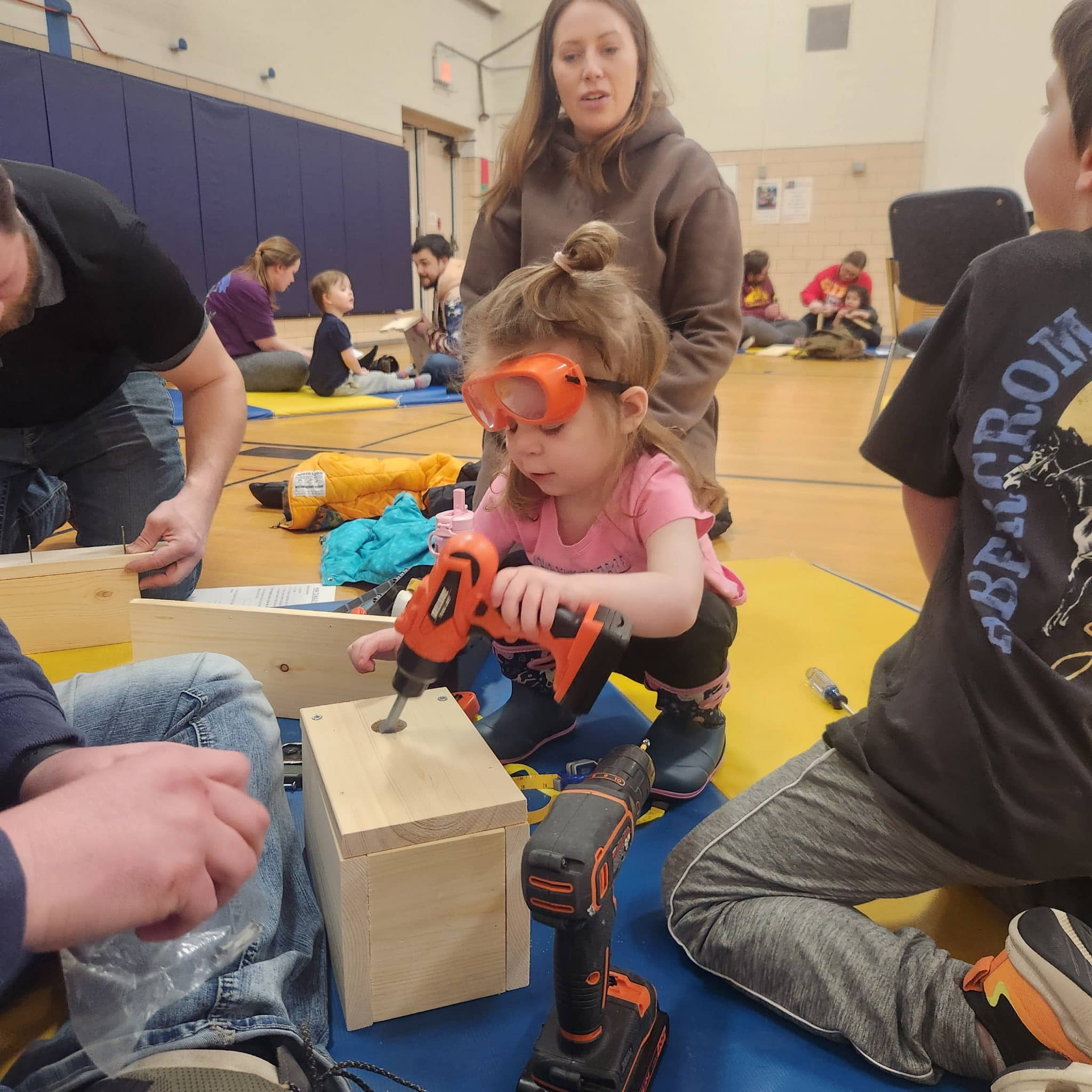STORY BY UMC ATHLETICS
A child with strawberry blonde hair bordering on red strides up to a horse called Charging Yankee, but despite the name the horse is tame in this moment allowing the young man to approach him in a pasture and hop right on his back and just ride around together along the Illinois prairie.
For Minnesota Crookston junior wide receiver Kyler Banks growing up around horses and knowing their cadences and their ticks have become second nature. This particular horse was a special one, one that Kyler’s Father Josh and Grandfather Craig had long-since convinced Kyler was born on the same day as he was. So that bond was forged at an early age.
See, Kyler Banks has been around horses his entire life. It has become the family business, of sorts, stemming back 49 years ago when his grandfather Craig spent $500 on a horse named Tennessee Myrtle instead of buying a motorcycle like he had originally planned. That change of heart has developed into a passion for Standardbred harness racing that has been passed on to generations of Kyler’s family, from his grandpa up to his great grandpa and back down to Kyler’s father, himself, his siblings, and many cousins.
The Banks family has grown up going around the country to state fairs, city fairs, to Running Aces Racetrack in Columbus, Minn., and to Prairie Meadows Racetrack in Altoona, Iowa.
“I come from a big family and harness racing has definitely become a big family affair,” said Banks. “My Grandpa still does it, and his brother Ron still owns a couple horses and has cousins and his great nephews that he works with. They train the horses and get them ready every week. Ron was actually recently inducted into the Minnesota Harness Racing, Inc. Living Hall of Fame. We have another cousin, Mary, her son Scott still races horses with his son. My dad will announce races every once and awhile, and he is still involved with racing every once and awhile. My cousin Mitch and his brother Kerry, two sons of Ron, they still help out and love going to the races and love seeing their Dad watching them and seeing their horses win.”
Kyler has been around the Banks harness racing tradition since he was released from the hospital after he was born. He has developed countless memories with his large family centered around the sport that has become a love of his and of his family.
“Some of my favorite memories have to be with my siblings at the small town county fairs when we would actually pull each other on the carts around the track and take turns having fun there,” said Banks. “Another great memory was spending a month with my Grandpa Craig when he lived in Illinois out on his farm. I was around the horses every day. There was a horse, Charging Yankee, that my Grandpa and Dad always said was my horse. They convinced me that his birthday was the same day as mine, and same age. I could just go up to him in the pasture and hop right on his back and just ride. I had a lot of great memories created during that month spent on my Grandpa’s farm.”
Not a lot of people understand Standardbred harness racing like the Banks family. Most people are familiar with thoroughbred racing which has become popular with the Kentucky Derby, Preakness Stakes, and Belmont Stakes that create the Triple Crown. Standardbred horses harken back to 18th century England and are known as being solid, well-built horses. Harness racing consists of a Standardbred horse pulling a light two-wheeled vehicle called a sulky.
“With harness racing, there is Standardbred and thoroughbred,” Banks explained. “We do Standardbred so that is with the cart. Within that class, there are a trotters and pacers division. They do different running styles with the horse. Different states have different laws with harness racing and whether you can have a casino or slots. That actually helps out with the purse that goes into the races and the incentive to be a harness racer.”
Banks further explained everything that goes into getting a Standardbred horse trained and ready to harness race.
“A lot of it is training the horses every day and keeping them well fed and their stalls clean,” Banks said. “Giving them some time in the pasture and time to relax and cool down and get away from the running, kind of similar to athletes. There are a lot of different things that you can put on the horses that they wear. Some horses are more fidgety or frightened easily, so some harness races put hoods that don’t cover their eyes but so they can’t see the stands or other horses. You can also put weights on different hooves of the horse. So if a horse has a tendency to strike the back of their other leg, you can put a weight on that foot so that it doesn’t go up as far, to save your horses wear and tear.”
His experience of growing up around harness racing, has taught Kyler a lot about people and about life in general. Lessons that he continues to take to this day, in life, and on the football field.
“It has actually taught me a lot with people,” Banks stated. “Everyone has a story and everyone has a background and how they got into harness racing. No story is the same. It is awesome to hear. Never judge a book by its cover. Being around harness racing has taught me at a really young age about that. There would be some kind of goofy looking people, I guess, kind of scary at a young age but they were some of the nicest people I have ever met. Never be afraid to help someone out in a time of need. The harness racing community is a very close-knit group and everyone looks out for each other and tries to help each other out. Out on the track, it is fair game, there is no easy coast for the win. Right out of the gate, there is a lot of bumping with the carts and getting real close to the guy ahead of you with the horse. Maybe sometimes bumping them in the back of the head, not entirely on purpose. It has taught me a lot and I wouldn’t change it for anything.”
Kyler’s story is so much more than just his family’s background around harness racing. Though the harness racing is a great memory, he also has a tough memory of having the family home foreclosed on that has helped shape him as a man and allow his to handle adversity in stride.
“Our house got foreclosed on,” Kyler said. “A little background on that, is my parents admitted to me and my two siblings that they weren’t the smartest with their money. They also didn’t all of a sudden want to stop giving us the things to help make our childhood memorable and loving. They figured time with the family and experience over money. I am grateful that they did that. They have given so much for me and my siblings. I don’t think I will ever be able to repay them. From having to live with my grandma for a few months to an apartment building that we actually had a family member own to family living in the house we live in now. It taught me a lot about how much family means. It taught me that money doesn’t mean everything. It is about the times and experiences with people that you love and enjoy being around.”
Kyler’s loving parents Josh and Missy Banks, also helped set him up with the opportunity to be successful on the football field where he earned a scholarship to compete for the Golden Eagles. Kyler, originally came in as a defensive back but his background of being from a small community and being able to handle adversity in stride, allowed him to make the change to offense with no issues at all.
“It has been good,” Banks explained about making the transition to wide receiver. “I have actually really enjoyed it. I am grateful I came from a small town where I was able to play offense and defense. For maybe some other guys it would be more of a challenge, but since I have the background on both sides of the ball it has been pretty easy for me. The coaches have been amazing with getting me to transition from offense to defense last year. I have enjoyed every second of it. I love defense but I also love offense. It is great to see both sides of the ball.”
Banks’ hard work off the field in making the transition paid off this year as he caught his first collegiate touchdown pass against Wayne State College in Wayne, Neb., on Oct. 5.
“It felt great (being able to catch the touchdown pass from Tristan Robbins),” Banks said. “Definitely if you watch it, it looks like I wasn’t grateful for being there, but I have always been taught to act like you have been there. On the inside, I was happy as heck. After the game, my parents told me that the whole town was proud of me. They sent me a photo from my hometown paper. They did a little article on how I scored a touchdown. It has been awesome.”
When it comes down to it, Banks has been there. Competition is nothing new to him because of the long history of winning and success that his family has in Standardbred harness racing. A sport that has taught Kyler so much. His passion for horses and the little known sport fuels him to want to spread the word about the sport and get back to his family and his roots in harness racing.
“Not a lot of people know about harness racing,” Banks said, “If you aren’t born into it or shown it, a lot of people don’t know what Standardbred harness racing is. A lot of people know thoroughbred because of the Triple Crown, but they don’t really know Standardbred. I kind of want to market harness racing more once I graduate. Because of growing up with horses all of my life I love horses and hopefully own a couple when I am older. I don’t know if I will race them but at least train them and have them race and possibly get a job with Running Aces and help them reach a broader community.”
To Kyler, harness racing is about family, and about love and about passion. A family that has always been there for him through thick and thin. And a family that has ignited a passion for horses that will always run wild and that he hopes to build on after he makes his last catch on the gridiron, pulls of the cleats, and heads back for the horse trotting around the pasture.

